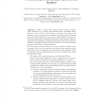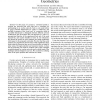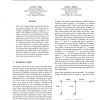109
Voted
WINE
2005
Springer
15 years 6 months ago
2005
Springer
We propose a simple and intuitive cost mechanism which assigns costs for the competitive usage of m resources by n selfish agents. Each agent has an individual demand; demands are...
108
Voted
ISAAC
2005
Springer
15 years 6 months ago
2005
Springer
Consider an information network with harmful procedures called attackers (e.g., viruses); each attacker uses a probability distribution to choose a node of the network to damage. O...
INFOCOM
2005
IEEE
15 years 6 months ago
2005
IEEE
— We propose a novel mechanism for routing and bandwidth allocation that exploits the selfish and rational behavior of flows in a network. Our mechanism leads to allocations th...
105
Voted
INFOCOM
2005
IEEE
15 years 6 months ago
2005
IEEE
— In this paper, we propose a cost-based model to evaluate the resources that each node has to contribute for participating in an overlay network. Such a cost model allows to gau...
96
Voted
SPAA
2006
ACM
15 years 7 months ago
2006
ACM
We consider a model of game-theoretic network design initially studied by Anshelevich et al. [2], where selfish players select paths in a network to minimize their cost, which is...
109
Voted
SIGECOM
2006
ACM
15 years 7 months ago
2006
ACM
We consider a multicast game with selfish non-cooperative players. There is a special source node and each player is interested in connecting to the source by making a routing de...
127
Voted
WIOPT
2006
IEEE
15 years 7 months ago
2006
IEEE
— This paper reverse-engineers backoff-based random-access MAC protocols in ad-hoc networks. We show that the contention resolution algorithm in such protocols is implicitly part...
112
Voted
INFOCOM
2006
IEEE
15 years 7 months ago
2006
IEEE
—We consider routing games where the performance of each user is dictated by the worst (bottleneck) element it employs. We are given a network, finitely many (selfish) users, eac...
114
Voted
FOCS
2006
IEEE
15 years 7 months ago
2006
IEEE
We advance significantly beyond the recent progress on the algorithmic complexity of Nash equilibria by solving two major open problems in the approximation of Nash equilibria an...
120
Voted
TARK
2007
Springer
15 years 7 months ago
2007
Springer
Most work in game theory assumes that players are perfect reasoners and have common knowledge of all significant aspects of the game. In earlier work [Halpern and Rˆego 2006], w...



